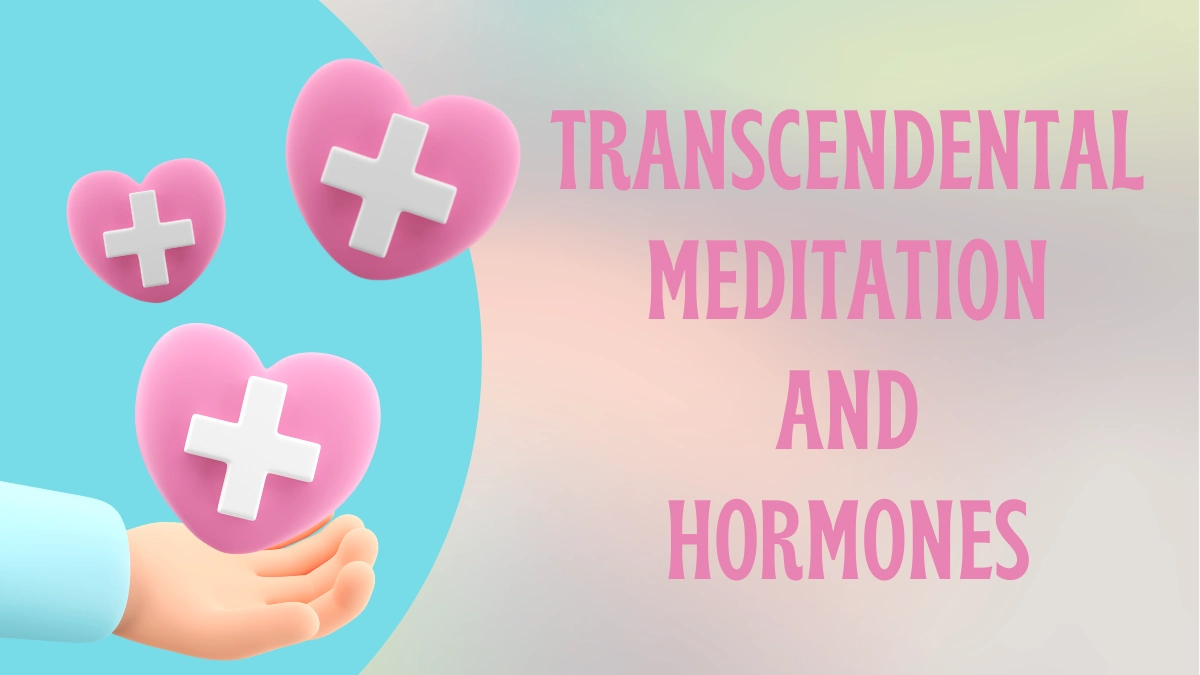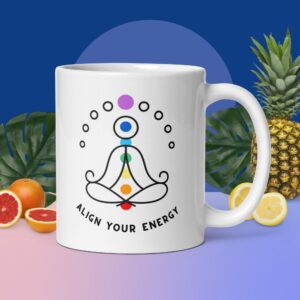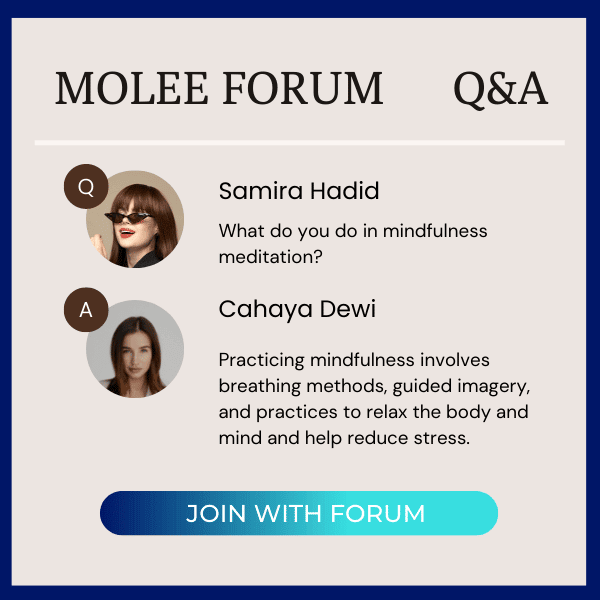Table of Contents
- Hormones
- Transcendental Meditation (TM)
- Hormone Levels Changes During Transcendental Meditation
- Transcendental Meditation and Mental Health
- Impact on Stress-Related Hormones
- TM’s Influence on Sex Hormones
- TM Effects on Sleep Quality and Growth Hormone
- Long-Term Hormonal Effects
- Research Studies
- 1. Daytime hormonal rhythms in practitioners of the transcendental meditation-Sidhi program
- 2. Hormonal and biochemical responses to transcendental meditation
- 3. Effects of the transcendental meditation program on adaptive mechanisms: Changes in hormone levels and responses to stress after 4 months of practice
- FAQs on Transcendental Meditation and Hormones
- Final Thoughts
Do you sometimes feel like your moods are out of control and your body is not supporting for daily tasks?
It could be your hormones acting up. But there’s good news – something as simple as Transcendental Meditation might help. In this article, we’ll talk about how this kind of meditation can help balance your hormones and make you feel better mentally and physically.
If you’re looking for a natural way to feel more stable and clear-headed, stick around. We’re going to look at how this easy practice could make a big difference in your life.
So let’s discuss the connection between Transcendental meditation and hormones in depth.
Hormones
Transcendental meditation has been considered to influence various hormones in the body, impacting stress, relaxation, and overall well-being. Research suggests that regular practice may lead to notable changes in hormone levels and their corresponding physiological processes.
Before going to understand the effect of meditation for hormones, let’s get an basic idea of different hormones and why they are important to our body.
Read our article on the connection in between TM and physical health.
Dopamine
Dopamine is a type of chemical called a neurotransmitter, which is used by the nervous system to send messages between nerve cells. Think of it as a messenger in your brain.
Dopamine plays a big role in how we feel pleasure. It’s often called the “feel-good” hormone because of its link to positive emotions and sensations.
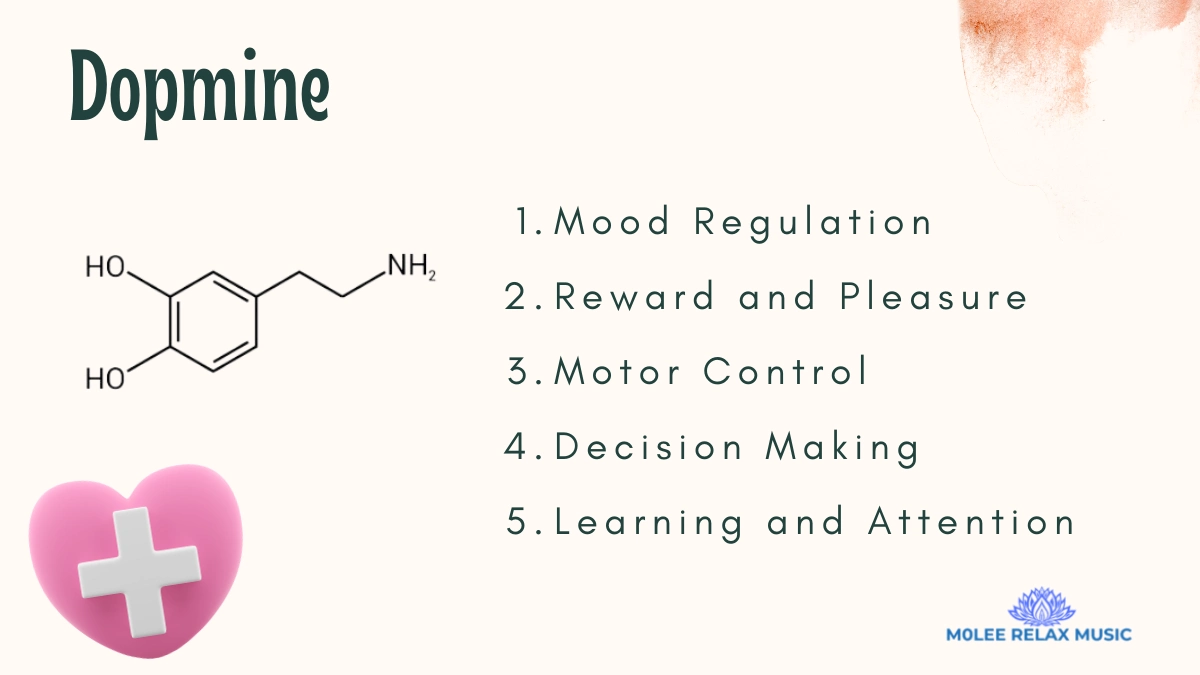
Here are some of the main tasks of dopamine:
1. Mood Regulation: Dopamine helps to control what we feel and how we express those feelings. It’s important for feeling happiness.
2. Reward and Pleasure: This hormone is famous for its role in the reward system of the brain. It delivers feelings of enjoyment and reinforcement to motivate us to do, or repeat, activities like eating, exercising, or bonding with loved ones.
3. Motor Control: Dopamine helps regulate movement and coordination. When there’s a decrease in dopamine, it can lead to conditions like Parkinson’s disease, where a person has trouble moving and may experience tremors or stiffness.
4. Decision Making: It plays a role in how we make decisions, from the simple ones like choosing what to eat, to more complex ones like evaluating risks and rewards.
5. Learning: Dopamine is involved in learning by reinforcing rewarding experiences that help us retain information and learn new skills or behaviors.
6. Attention: It affects our attention span and concentration. Good levels of dopamine can help us focus and stay attentive to tasks.
7. Motivation: It can influence our drive and ambition. Dopamine levels can affect whether we feel motivated to undertake activities or pursue our goals.
Understanding dopamine and its tasks can help explain a lot about human behavior, from why we enjoy certain activities to how we interact with others.
Serotonin
Serotonin is a neurotransmitter, which means it’s a chemical that helps send messages in the brain. It’s sometimes called the “happy chemical” because it contributes to feelings of well-being and happiness.
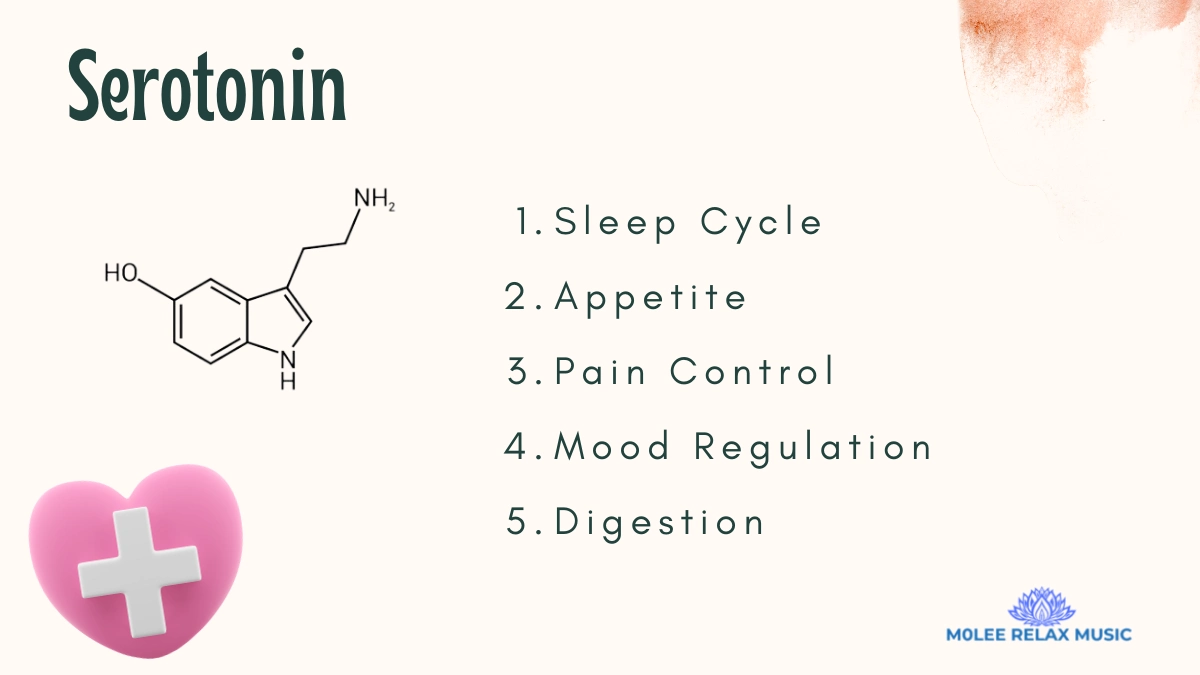
Here are some of the key tasks of serotonin:
- Mood Regulation: Serotonin helps to regulate your mood. Higher levels of serotonin are associated with a better mood, while lower levels are linked to mood disorders like depression.
- Sleep Cycle: It plays a role in controlling your sleep cycle and the ability to fall asleep.
- Appetite: Serotonin affects how much you eat by regulating your appetite, which can influence your weight.
- Pain Control: It’s involved in how your body processes pain, and higher levels can help reduce the perception of pain.
- Digestion: Serotonin also helps control your bowel movements and function.
Understanding serotonin is important because it affects many parts of your daily life, including your emotions, how well you sleep, and your general sense of well-being.
Cortisol
Cortisol is a hormone that’s often called the “stress hormone” because it’s released in higher amounts during the body’s ‘fight or flight’ response to stress. It’s produced by the adrenal glands, which are located on top of your kidneys.
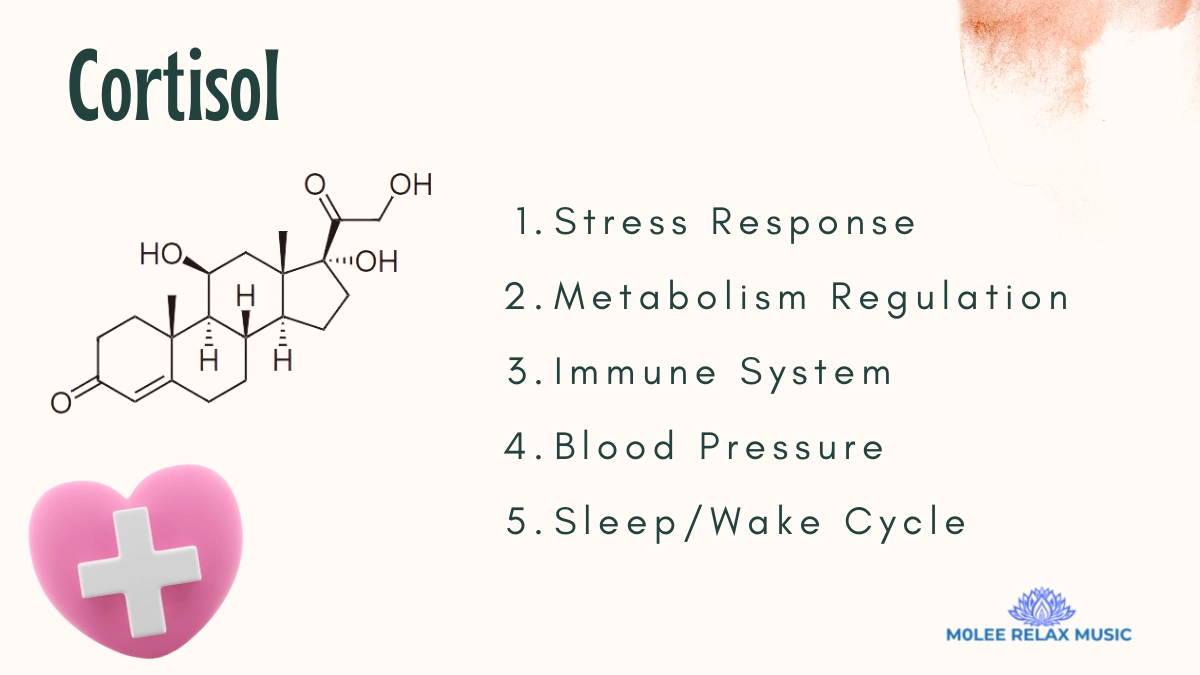
Here are some of the key tasks of cortisol:
- Stress Response: Cortisol prepares your body to deal with stressful situations by increasing glucose in the bloodstream and enhancing your brain’s use of glucose, as well as increasing the availability of substances that repair tissues.
- Metabolism Regulation: It helps in the metabolism of fats, proteins, and carbohydrates, which is the process your body uses to get or store energy from the food you eat.
- Immune System: Cortisol can suppress the immune system’s response, which is beneficial in controlling inflammation and helping the body cope with short-term stress.
- Blood Pressure: It helps to maintain blood pressure and cardiovascular function, preparing your body to respond quickly to a threat or challenge.
- Sleep/Wake Cycle: Cortisol has a natural cycle that helps regulate your sleep/wake patterns, usually peaking in the morning and declining throughout the day.
Understanding cortisol is important because, while it’s essential for survival, chronic high levels due to prolonged stress can lead to health problems, including weight gain, high blood pressure, and a weakened immune system.
GABA (gamma-aminobutyric acid)
Gamma-Aminobutyric Acid (GABA) is a neurotransmitter in the brain that acts as a messenger to help calm nerve activity. It is known as an inhibitory neurotransmitter because it helps to reduce the likelihood that a nerve will fire an action potential (a signal).
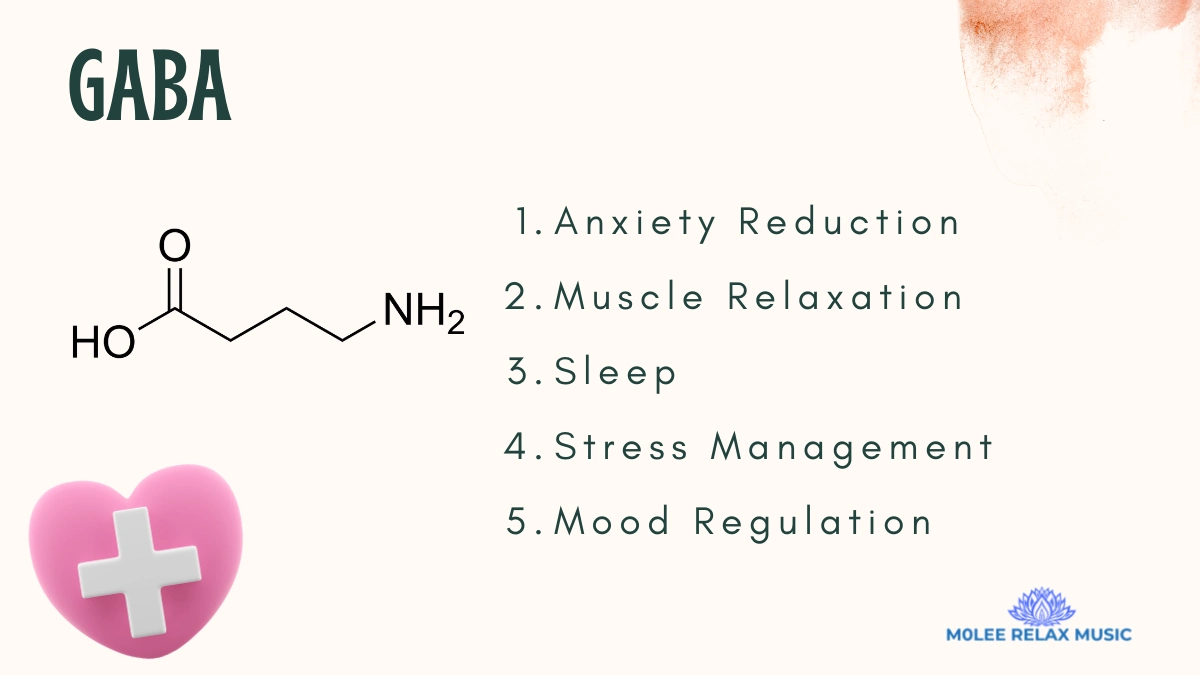
Here are some of the key tasks of GABA:
- Anxiety Reduction: GABA can help decrease feelings of anxiety and fear by reducing neuronal excitability in the brain.
- Muscle Relaxation: It contributes to muscle tone regulation and can help with relaxation and reducing muscle tension.
- Sleep: GABA is involved in sleep regulation and can promote restful sleep.
- Stress Management: By inhibiting nerve cell activity, GABA can help manage stress and promote a sense of calm.
- Mood Regulation: It plays a role in mood regulation and may help prevent mood disorders.
Understanding GABA is important because it helps to balance our brain activity and maintain mental and physical health. If GABA levels are too low, it can lead to conditions such as anxiety, sleep disorders, and mood disorders.
Next, let’s learn more about Transcendental meditation. In our web site, we discussed transcendental meditation technique in depth and covering lot of aspects, We suggest you to explore our website more insightful details.
Transcendental Meditation (TM)
TM is a simple, silent form of meditation where you sit comfortably with your eyes closed and repeat a special word or sound, called a mantra, in your mind. This technique is practiced for about 20 minutes twice a day. It’s designed to help you relax, reduce stress, and find inner peace.
People who practice TM often say it helps clear their mind and makes them feel calm. It’s a popular meditation method that has been studied for its potential benefits on health and well-being.
Hormone Levels Changes During Transcendental Meditation
Transcendental Meditation has been observed to influence various hormonal systems in the body. Research indicates that regular practice may result in changes to stress-related hormones and the regulation of other hormonal functions.
Can meditation help with hormonal imbalance?
Meditation, and specifically TM, can have a regulatory effect on hormones. Studies have suggested that practitioners often experience a decrease in stress-associated hormones which may help in restoring hormonal balance.
Does TM reduce cortisol?
Evidence points toward TM potentially reducing cortisol, a hormone released in response to stress. While research shows that TM may not significantly affect cortisol levels in all individuals, there is a trend toward lower cortisol levels in some practitioners after consistent meditation.
Transcendental Meditation and Mental Health
In this section, we will talk about Transcendental Meditation and its linked mental health benefits, including reduced stress and anxiety.
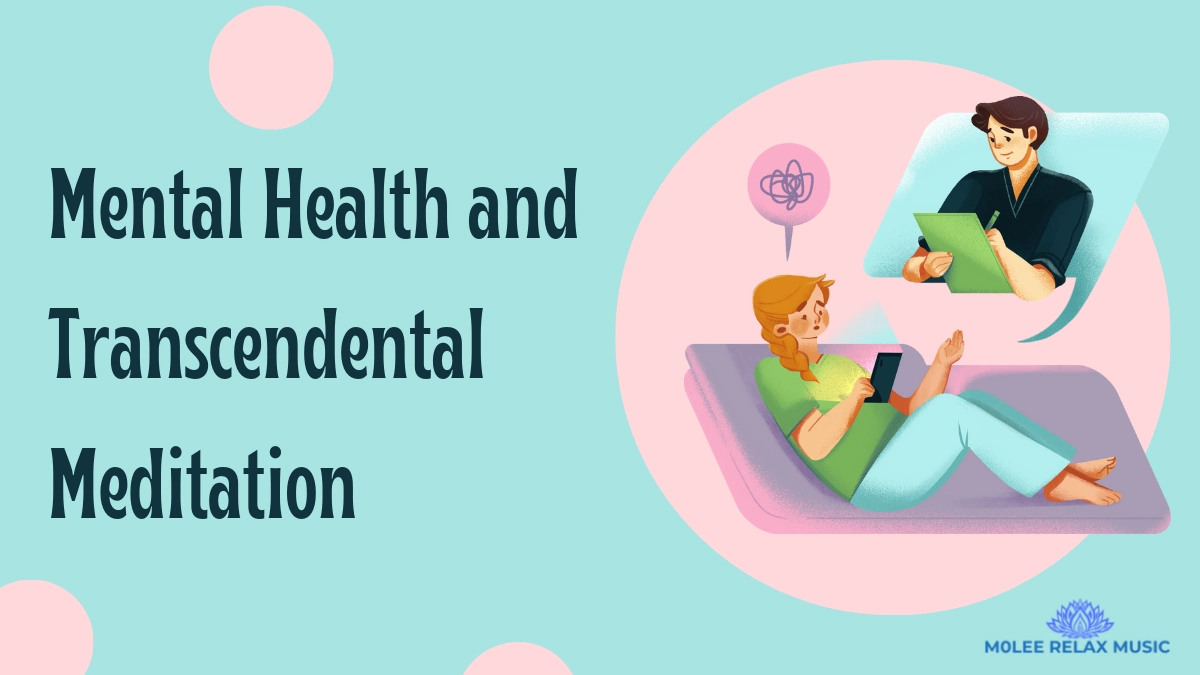
Can Transcendental Meditation build new neurons in the brain?
Studies have not conclusively proven that Transcendental Meditation can build new neurons, a process known as neurogenesis. Most neurogenesis occurs during development, although some areas of the brain may generate new neurons throughout life.
What happens to your brain during Transcendental Meditation?
During Transcendental Meditation, your brain activity changes, promoting a state of deep relaxation. This type of meditation increases brain coherence, which means different parts of the brain communicate better with each other.
It also reduces the activity in the default mode network, which is active when the mind is wandering and not focused on the outside world. This can lead to reduced stress, better focus, and a sense of calmness.
Read our article on Transcendental meditation effects on the brain to get more insightful details.
What are Neurotransmitters and Neurochemicals ?
| Aspect | Neurotransmitters | Neurochemicals |
|---|---|---|
| Definition | Neurotransmitters are chemicals that transmit signals across a synapse from one neuron to another. | Neurochemicals are a broad range of chemicals, including neurotransmitters, that influence and regulate the nervous system. |
| Function | They are specifically involved in communication between neurons in the brain and body. | They include neurotransmitters but also other molecules that affect neuron function like hormones and neuromodulators. |
| Types | Examples include dopamine, serotonin, GABA, and glutamate. | Includes all neurotransmitters plus other chemicals like hormones (e.g., cortisol), and gases like nitric oxide. |
| Role in the Body | Involved in mood regulation, muscle movement, cognitive function, and more. | They have various roles, including neurotransmitter functions, metabolism, growth, and response to the environment. |
| Impact on Behavior | Can influence emotions, decision-making, and physical actions. | Their impact is broad, affecting overall health, behavior, mood, and cognition. |
Can meditation improve happiness?
Yes, meditation can improve happiness. Many studies suggest that regular meditation practice can lead to an increase in overall happiness and well-being. Meditation can reduce stress, anxiety, and depression, which are significant barriers to happiness.
By promoting relaxation, enhancing self-awareness, and fostering a greater sense of calm and inner peace, individuals who meditate often report higher levels of satisfaction and contentment in life. Additionally, meditation can improve the brain’s ability to regulate emotions, which can lead to a more positive mood and outlook.
Impact on Stress-Related Hormones
lets’ talk about the TM ‘s potential to modulate stress-related hormones, specifically adrenaline, noradrenaline, and DHEA. These studies investigate how TM practice may influence the hormonal markers associated with the body’s stress response.
| Hormone | Function in Stress Response | Effects on the Body |
|---|---|---|
| Adrenaline | Quickly prepares your body for action (“fight or flight”). | Increases heart rate, blood pressure, and energy supplies. |
| Noradrenaline | Similar to adrenaline, but more focused on the brain’s response to stress. | Enhances alertness, arousal, and sharpens concentration. |
| DHEA | Balances the effects of cortisol and supports recovery from stress. | Helps in the growth of muscle, improves immune response, and provides energy. |
Adrenaline and Noradrenaline
Transcendental Meditation has been observed to affect the levels of adrenaline and noradrenaline, pivotal hormones in the body’s fight-or-flight response. Practitioners have shown altered levels of these hormones during and after TM sessions. The implications suggest a reduced stress response, which may correspond with a state of increased relaxation and physiological calmness.
DHEA
DHEA (dehydroepiandrosterone) serves as a counterbalance to stress hormones and is often considered a marker for stress resilience and aging. Regular TM practice has the potential to increase DHEA levels, which might imply enhanced stress management and possibly increased longevity and improved overall well-being among consistent practitioners.
TM’s Influence on Sex Hormones
We can not forget the sexual life of humans, so in this section. we will explore the specific effects on sex hormones, including testosterone and the balance of estrogen and progesterone.
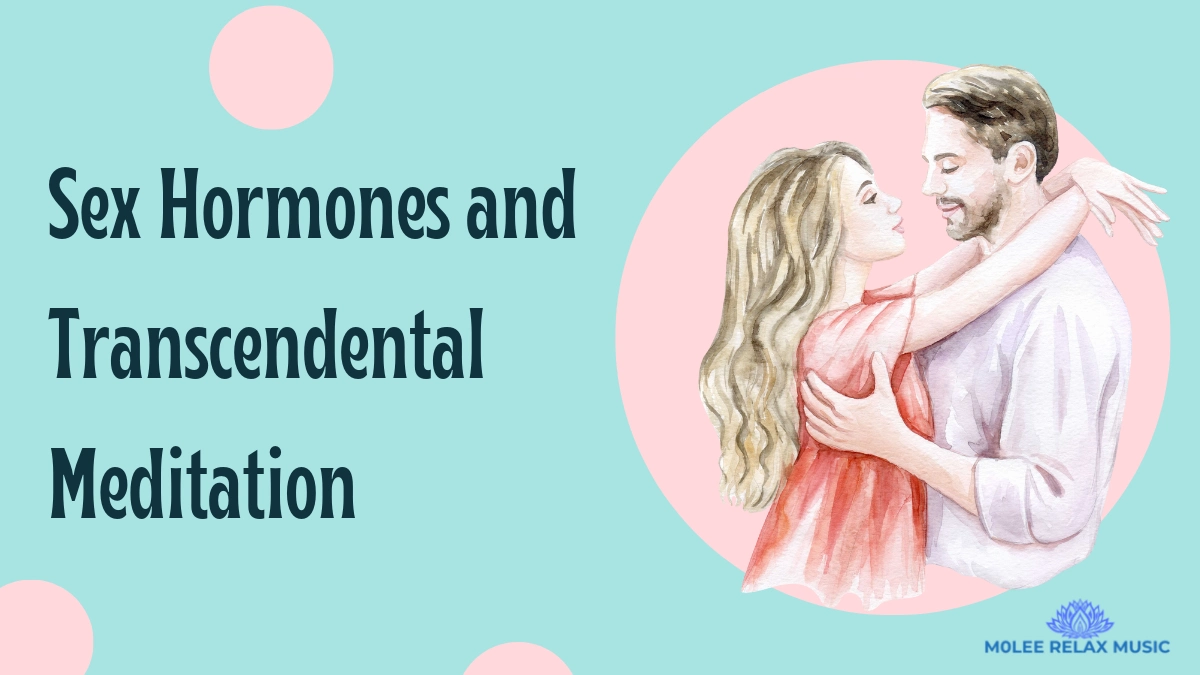
Research points to potential changes in these hormone levels as a result of regular TM practice.
| Hormone | Primary Function | Effects on the Body |
|---|---|---|
| Testosterone | Regulates male secondary sexual characteristics and libido. | Supports muscle growth, bone density, and sperm production. |
| Estrogen | Regulates female reproductive system and secondary sexual characteristics. | Controls the menstrual cycle, affects reproductive tissues, and maintains bone health. |
| Progesterone | Prepares the body for pregnancy and maintains the early stages of pregnancy. | Supports the menstrual cycle and early stages of pregnancy, and affects mood and libido. |
Does Transcendental Meditation increase testosterone?
Research indicates that Transcendental Meditation may influence testosterone levels, with a study showing that regular TM practice could lead to hormonal changes in male meditators. These findings suggest that TM might have a role in modulating testosterone, which is crucial for muscle mass, fat distribution, and overall well-being.
However, more research is needed to fully understand the relationship between TM and testosterone regulation.
Estrogen and Progesterone Balance
In females, the balance between estrogen and progesterone is crucial for reproductive health and mood regulation. Preliminary findings suggest that the regular practice of meditation could play a role in maintaining this balance, potentially impacting overall endocrine health.
TM Effects on Sleep Quality and Growth Hormone
This section is dedicated about the transcendental meditation’s improvements in sleep quality and alterations in hormone levels. These changes may have significant implications for an individual’s wellbeing.
Growth Hormone
Mediation practices, such as Transcendental meditation, show a regulatory impact on growth hormone secretion. Growth hormone, primarily released during sleep, plays a crucial role in tissue repair and regeneration.
Transcendental meditation can enhance the body’s natural release patterns of this hormone, thereby potentially improving physical health and recovery processes.
Sleep Cycle Regulation and Melotonin
Regular practice of Transcendental meditation has been closely associated with better sleep cycle regulation. It leads to changes in various hormones which are critical to the sleep-wake cycle, including melatonin and cortisol.
Melatonin is a hormone produced by the pineal gland in the brain, primarily responsible for regulating the sleep-wake cycle. It is often referred to as the “sleep hormone,” as its levels rise in the evening to promote sleep and decrease in the morning to help wake you up.
The tasks of melatonin go beyond just sleep, it also has roles in antioxidant activity and supporting the immune system.
Studies indicate that practitioners often experience longer periods of N3 deep sleep, and increased REM sleep stages, leading to more restorative sleep. Meditation practices influence brain functions, induce various intrinsic neural plasticity events, modulate autonomic, metabolic, endocrine, and immune functions, and thus mediate global regulatory changes in various behavioral states, including sleep.
Long-Term Hormonal Effects
Now we look at the long term sustained changes of TM towards the hormones about how it would be beneficial to our overall health.
Insulin and Glucose Metabolism
Transcendental Meditation has been associated with improvements in the regulation of insulin and glucose metabolism. This stability is crucial as it helps in lowering the risk of type 2 diabetes by impacting hormonal pathways that govern blood sugar levels.
Chronic Conditions and Hormonal Profiles
Meditation practices like Transcendental Meditation may influence the hormonal profiles associated with chronic conditions. Specific hormones, including those related to stress response such as cortisol, can be modulated through regular meditation, potentially ameliorating conditions influenced by chronic stress.
Research Studies
We will cover few scientific studies aimed at uncovering TM’s effects on hormone levels and stress responses. Researchers have utilized a variety of methodologies including randomized clinical trials and biochemical assays to investigate these effects.
1. Daytime hormonal rhythms in practitioners of the transcendental meditation-Sidhi program
- The study[1] included five participants (two women and three men) with at least two years of TM-Sidhi experience.
- Blood samples were collected hourly from 9 AM to 9 PM, with meditation practiced from 12 PM to 1 PM.
- Hormones measured included cortisol, ACTH (adrenocorticotropic hormone), and catecholamines (adrenaline and noradrenaline), using specific laboratory techniques.
- Results showed a typical morning peak in cortisol levels, with no significant change during meditation.
- ACTH levels did not change throughout the day but increased after meditation.
- Catecholamine levels did not significantly vary between morning and afternoon but decreased after meditation, with the lowest levels at 2 PM.
- The study concludes that TM-Sidhi practitioners have different hormone secretion patterns than normally seen, particularly after meditation.
- Meditation seems to affect the sympathetic nervous system and neuroendocrine axis, leading to these hormonal changes.
- The findings support the idea that TM-Sidhi might modulate circadian rhythms of hormones.
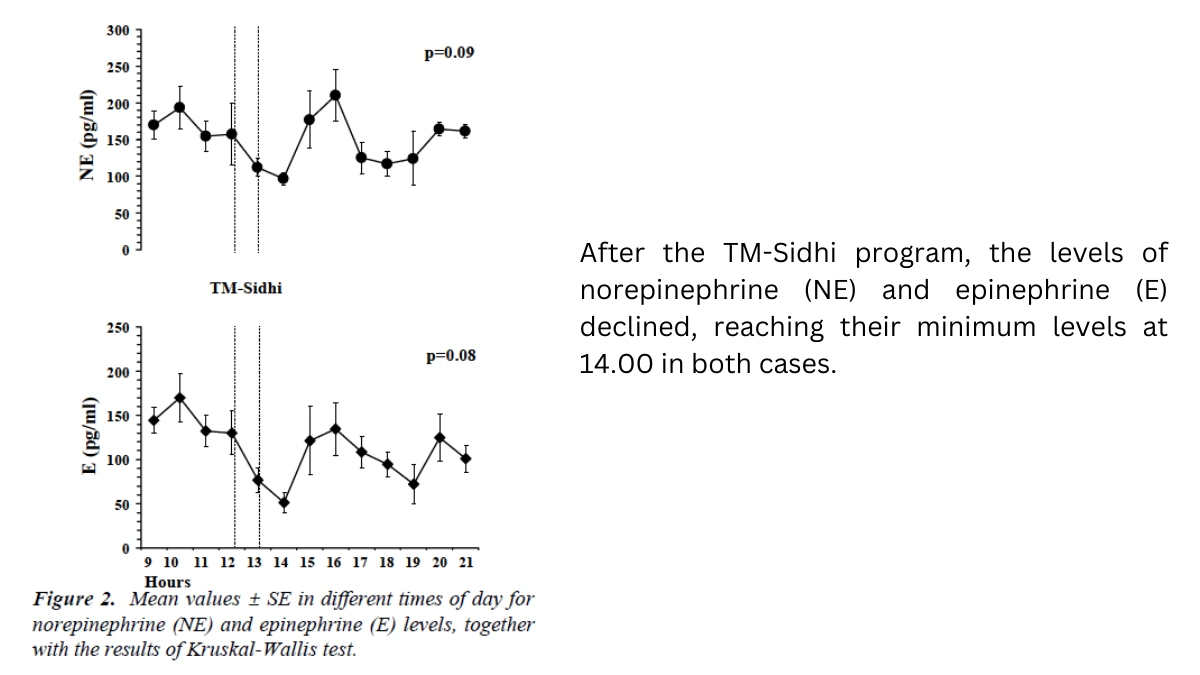
2. Hormonal and biochemical responses to transcendental meditation
- The study [2] aimed to determine if TM affects endocrine responses in experienced male meditators.
- Meditators practiced TM for 40 minutes in the morning, while controls simply relaxed.
- No significant differences were found between meditators and controls for:
- Carbohydrate metabolism (measured by plasma glucose, insulin, and glucagon levels).
- Pituitary hormones (growth hormone and prolactin).
- Stress hormones (cortisol and total catecholamines), though meditators had slightly higher catecholamine levels.
- Plasma free fatty acids were significantly higher in meditators after TM, suggesting internal metabolic activity despite external relaxation.
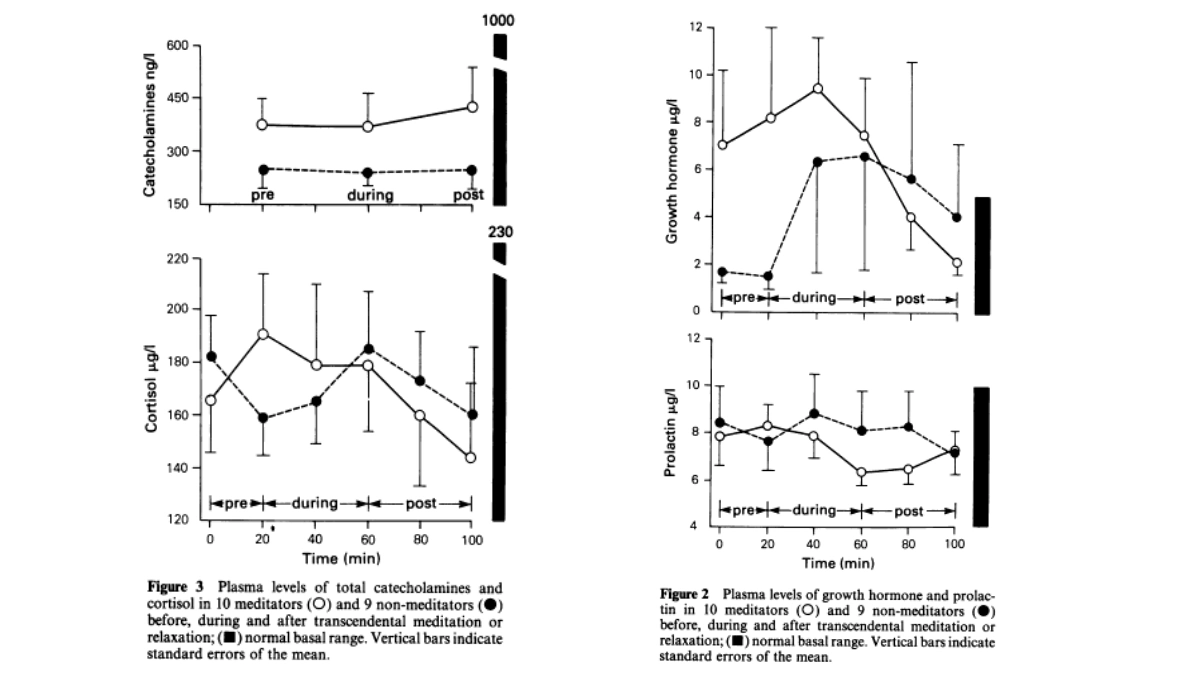
3. Effects of the transcendental meditation program on adaptive mechanisms: Changes in hormone levels and responses to stress after 4 months of practice
The study[3] investigated the effect of Transcendental Meditation on hormonal responses to stress, comparing it to a stress education control condition over four months. Here are the main findings in point form:
- The study was a prospective, randomized assignment study focusing on cortisol, growth hormone (GH), thyroid-stimulating hormone (TSH), and testosterone levels.
- Blood samples were taken before and after the 4-month period for both TM practitioners and control subjects.
- Significant or near-significant changes were observed in hormone levels for the two groups:
- In the TM group, basal cortisol levels and average cortisol levels during stress decreased, while cortisol responsiveness to stress increased.
- TSH and GH levels showed opposite changes in response to stress between the TM group and the control group.
- Testosterone baseline levels also changed in opposite directions for the two groups.
- The results suggest that TM practice may counteract the effects of chronic stress, particularly in cortisol and testosterone regulation.
- The changes in GH may be related to cortisol differences, while TSH changes are less clearly connected to chronic stress effects.
- The study supports previous research showing hormonal changes during TM practice that persist outside of practice.
- Prior studies have reported acute decreases in cortisol during TM, with long-term practitioners showing a more significant decline than non-practitioners or new practitioners.
- The people who practice of the transcendental meditation also showed lower 24-hour urinary cortisol excretion compared to controls, which was correlated with other physiological parameters linked to hypertension risk.
- The decrease in baseline cortisol in the TM group might indicate a reversal of prior chronic stress effects.
- The increased cortisol response to stress in the TM group after 4 months could further support the conclusion that TM reverses the effects of chronic stress, as chronic stress typically leads to high basal cortisol and low cortisol response to acute stressors.
- Changes in testosterone observed are consistent with the hypothesis that TM practice may mitigate chronic stress effects.
In summary, the study found that TM practice over four months affected baseline hormone levels and hormonal responses to stress, suggesting a potential role for TM in reversing the effects of chronic stress on hormonal regulation.
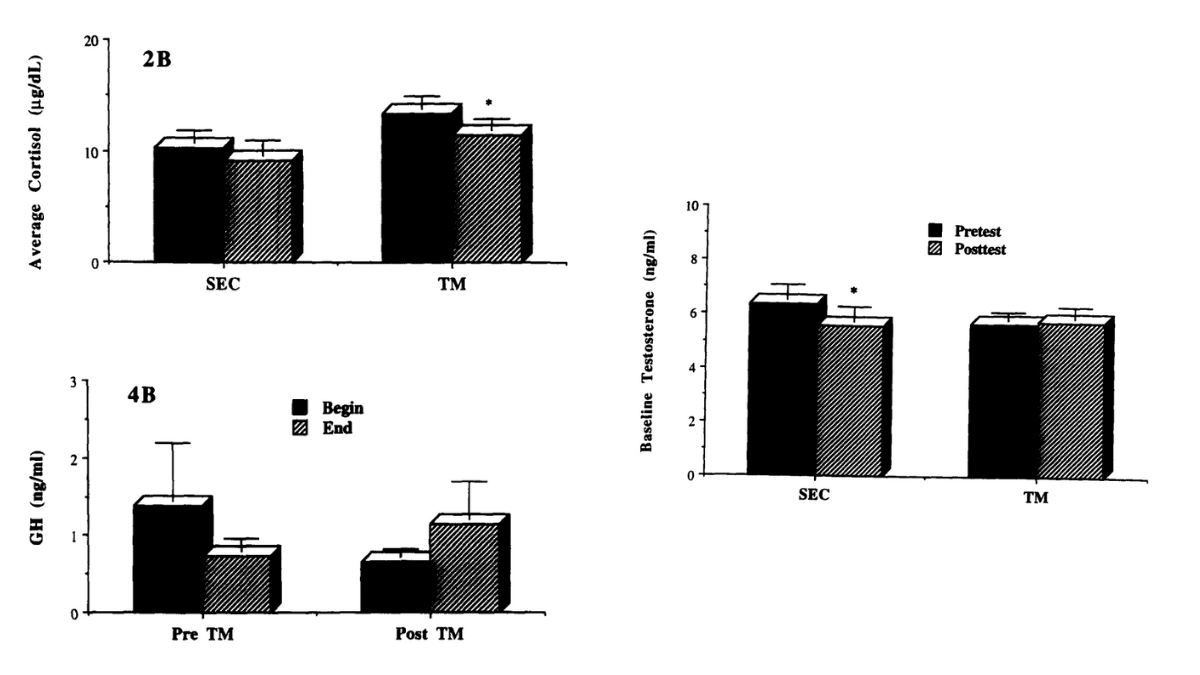
References
- Jose R. Infantea*; Fernando Peranb; Juan I. Rayoa; Justo Serranoa; Maria L. Domíngueza; Lucia Garciaa; Carmen Durana; Roman Sancheza; Ana Roldanc.
aNuclear Medicine Service, Infanta Cristina Hospital, Avda. Elvas, s/n. E-06080, Badajoz, Spain.
Link for paper - Cooper R, Joffe BI, Lamprey JM, Botha A, Shires R, Baker SG, Seftel HC. Hormonal and biochemical responses to transcendental meditation. Postgrad Med J. 1985 Apr;61(714):301-4. doi: 10.1136/pgmj.61.714.301. PMID: 3895206; PMCID: PMC2418240. Link for paper
- MacLean, Christopher & Walton, Kenneth & Wenneberg, Stig & Levitsky, Debra & Mandarino, Joseph & Waziri, Rafiq & Hillis, Stephen & Schneider, Robert. (1997). Effects of the Transcendental Meditation program on adaptive mechanisms: changes in hormone levels and responses to stress after 4 months of practice. Psychoneuroendocrinology. 22. 277-295. 10.1016/S0306-4530(97)00003-6. Link for paper
FAQs on Transcendental Meditation and Hormones
Can I balance my hormones naturally?
Yes, you can balance your hormones naturally through a healthy diet, regular exercise, adequate sleep, stress management techniques, and by avoiding hormone disruptors like certain plastics and pesticides.
What are the 4 happy hormones?
The four happy hormones are dopamine, serotonin, oxytocin, and endorphins, each playing a key role in regulating mood and promoting feelings of happiness and well-being.
Can meditation release growth hormone?
Meditation has been shown to potentially release growth hormone, as it can improve sleep quality and reduce stress, both of which are factors that contribute to the natural production of growth hormone.
Does meditation increase estrogen?
While direct evidence is limited, meditation may influence estrogen levels indirectly by reducing stress, which can affect hormone balance and lead to more stable estrogen production.
Can meditation increase oxytocin?
Meditation can potentially increase oxytocin levels by promoting relaxation and reducing stress, which can trigger the release of this “love hormone” associated with bonding and social connection.
Can practicing mindfulness meditation impact my hormonal health?
Yes, mindfulness meditation can have a positive effect on hormonal health by reducing stress-related hormones like cortisol and potentially increasing the production of mood-regulating hormones such as serotonin.
Final Thoughts
In conclusion, Transcendental Meditation has a significant impact on hormonal health, offering a natural way to promote hormonal balance and well-being. By reducing stress and fostering a state of relaxation, this practice can influence the levels of various hormones, contributing to improved physical and emotional health.
Whether you’re looking to reduce stress hormones like cortisol or boost mood-enhancing hormones, incorporating Transcendental Meditation into your routine may be a beneficial step towards achieving hormonal harmony.


